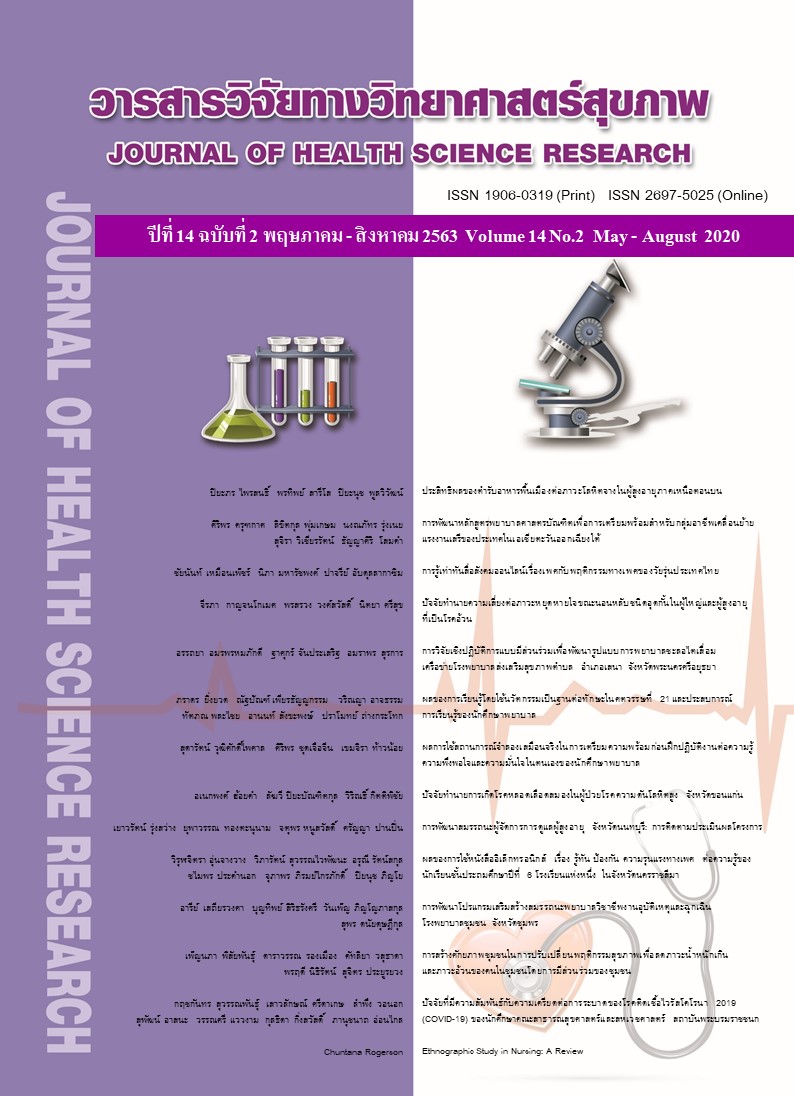ผลการใช้สถานการณ์จำลองเสมือนจริงในการเตรียมความพร้อมก่อน ฝึกปฏิบัติงานต่อความรู้ ความพึงพอใจและความมั่นใจในตนเอง ของนักศึกษาพยาบาล
Main Article Content
บทคัดย่อ
บทนำ: การเรียนการสอนโดยใช้สถานการณ์เสมือนจริงเป็นวิธีการสอนที่เปิดโอกาสให้ผู้เรียนได้เรียนรู้ผ่านสถานการณ์จำลองที่ใกล้เคียงกับสภาพการณ์จริงมากที่สุด และมีการนำมาใช้เพื่อพัฒนาด้านการสอนพยาบาลมากขึ้น
วัตถุประสงค์การวิจัย: เพื่อศึกษาผลของการใช้สถานการณ์จำลองเสมือนจริงในการเตรียมความพร้อมก่อนฝึกปฏิบัติงานต่อความรู้ ความพึงพอใจและความมั่นใจในตนเองของนักศึกษา
วิธีการวิจัย: การวิจัยกึ่งทดลอง กลุ่มตัวอย่างที่ศึกษาคือนักศึกษาพยาบาล จำนวน 80 ราย แบ่งเป็นกลุ่มทดลองและกลุ่มควบคุม เครื่องมือในการเก็บรวบรวมข้อมูลเชิงปริมาณ ประกอบด้วย แบบทดสอบวัดความรู้ แบบประเมินความพึงพอใจและแบบประเมินความมั่นใจในตนเอง วิเคราะห์ข้อมูลโดยใช้สถิติทดสอบค่าที และเก็บข้อมูลเชิงคุณภาพ โดยการสนทนากลุ่มและวิเคราะห์ข้อมูลโดยใช้การวิเคราะห์เนื้อหา
ผลการวิจัย: 1) กลุ่มทดลองมีค่าเฉลี่ยคะแนนความรู้และความมั่นใจในตนเองหลังทดลองสูงกว่าก่อนทดลองอย่างมีนัยสำคัญทางสถิติ 2) กลุ่มทดลองมีค่าเฉลี่ยคะแนนความรู้ ความพึงพอใจ และความมั่นใจในตนเองหลังทดลองสูงกว่านักศึกษากลุ่มควบคุมอย่างมีนัยสำคัญทางสถิติ 3) ผลการสนทนากลุ่มพบว่า นักศึกษามีความรู้ในเรื่องการประเมินผู้คลอดและการพยาบาลในระยะคลอด มีความพึงพอใจเพราะช่วยให้เข้าใจเนื้อหาการเรียนรู้มากยิ่งขึ้นจากการเรียนภาคทฤษฎี รู้สึกสนุก ได้แสดงบทบาทในการดูแลผู้คลอดและการตัดสินใจเหมือนเป็นพยาบาลจริง มีความมั่นใจที่จะให้การพยาบาลผู้คลอดในสถานการณ์จริง
สรุปผลการวิจัย: ผลการศึกษานี้สามารถนำไปใช้ส่งเสริมการเรียนรู้โดยใช้สถานการณ์จำลองเสมือนจริงเพื่อพัฒนาความรู้ ความพึงพอใจและความมั่นใจของนักศึกษา
Downloads
Article Details
บทความที่ได้รับการตีพิมพ์เป็นลิขสิทธิ์ของวิทยาลัยพยาบาลบรมราชชนนี จังหวัดนนทบุรี
ข้อความที่ปรากฏในบทความแต่ละเรื่องในวารสารวิชาการเล่มนี้เป็นความคิดเห็นส่วนตัวของผู้เขียนแต่ละท่านไม่เกี่ยวข้องกับวิทยาลัยพยาบาลบรมราชชนนี จังหวัดนนทบุรี และคณาจารย์ท่านอื่น ในวิทยาลัยฯ แต่อย่างใด ความรับผิดชอบองค์ประกอบทั้งหมดของบทความแต่ละเรื่องเป็นของผู้เขียนแต่ละท่าน หากมีความผิดพลาดใด ๆ ผู้เขียนแต่ละท่านจะรับผิดชอบบทความของตนเองแต่ผู้เดียว
เอกสารอ้างอิง
Cant RP, Cooper SJ. Simulation-based learning in nurse education: Systematic review. J Adv Nurs. 2010;66(1):3-15.
Gore T, et al. The effects of simulated clinical experiences on anxiety: Nursing students perspectives. Clin Simula Nurs. 2011;7:e175-e180.
Hick FD, Cokes L, Li S. The effect of high-fidelity simulation on nursing students knowledge and performance: a pilot study. National Council of state Boards of Nursing. 2009;40:1-27.
Waxman KT. The development of evidence-based clinical simulation scenarios: Guidelines for nurse educators. J Nurs Educ. 2010;49(1):29-35.
Jefferies PR. A framework for designing, implementing, and evaluating simulations used as teaching strategies in nursing. Nurs Educ Perspect. 2005;26:96-103.
O’Donnell JM, Decker S, Howard V, Levett-Jones T, Miller CW. NLN/Jeffries simulation framework state of science project: Simulation learning outcomes. Clin Simulat Nurs. 2014;10:373-382.
Yuan H, Williams BA, Fang J, Ye Q. A systematic review of selected evidence on improving knowledge and skills through high-fidelity simulation. Nurs Educ Today. 2012;32(3):294-8.
Kolb DA. Experiential learning: experience as the source of learning and development. Englewood Cliffs, NJ: Prentice Hall; 1984.
Hallmark BF, Thomas CM, Gantt L. The educational practices construct of the
NLN/Jeffries simulation framework: State of science project: simulation design characteristic. Clin Simulat Nurs. 2014;10: 345-52.
Groom JA, Handerson D, Sittner BJ. NLN/Jeffries simulation framework state of science project: Simulation design characteristic. Clin Simula Nurs. 2014;10: 337-44.
Gates MG, Parr MB, Hughen JE. Enhancing nursing knowledge using high-fidelity simulation. J Nurs Educ. 2012;51(1):9-15.
Liaw SY, Scherpbier A, Rethans J, Klainin-Yobas P. Assessment for simulation learning outcomes: a comparison of knowledge and self-reported confidence with observed clinical performance. Nurs Educ Today. 2012;32:e35-9.
Reese CE, Jeffries PR, Engum SA. Learning together: using simulations to develop nursing and medical student collaboration. Nurs Educ Perspect. 2010;31(1):33-7.
Wang AL, Fitzpatrick JJ. Use of simulation among Chinese nursing students. Clin Simulat Nurs. 2013;9:e311-17.
Partin JL, Payne TA, Slemmons MF. Students’ perceptions of their learning experiences using high-fidelity simulation to teach concepts relative to obstetrics. Nurs Educ Perspect. 2011;32(3):186-8.
Mould J, White, H, Gallagher R. Evaluation of a critical care simulation series for undergraduate nursing students. Cont Nurs J Aust Nurs Prof. 2011;38:180-90.
Schlairet MC. Simulation in an undergraduate nursing curriculum: implementation and impact evaluation. J Nurs Educ. 2011;50(10):561-8.


